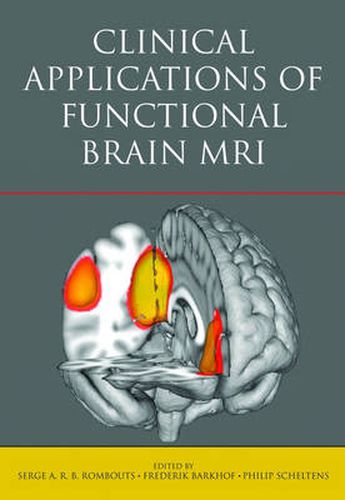Readings Newsletter
Become a Readings Member to make your shopping experience even easier.
Sign in or sign up for free!
You’re not far away from qualifying for FREE standard shipping within Australia
You’ve qualified for FREE standard shipping within Australia
The cart is loading…






Functional magnetic resonance imaging (FMRI) has become the most widely used method for imaging normal brain function in a relatively short period of time. The use of FMRI in clinically related research has been much slower; however, FMRI is now becoming a valuable tool in the study of many neurological and psychiatric disorders. This book explains the status of current clinical applications of FMRI in preoperative evaluation, diagnosis and discrimination of pathology, and in understanding recovery, therapeutics and rehabilitation of neurological and psychiatric conditions. Individual chapters cover the use of FMRI in the preoperative assessment of both motor function and language as well as in the assessment of age-related changes in memory. More focused chapters cover the use of FMRI in specific medical conditions including dementia, schizophrenia, depression and anxiety disorders, stroke, Parkinson’s disease and multiple sclerosis. The book concludes with a chapter on the role of FMRI in monitoring changes in brain function following exposure to clinical pharmacotherapeutics and experimental drug compounds. This book will be of interest to both novice FMRI researchers and expert FMRI scientists as well as to clinicans in neurology, radiology and psychiatry.
$9.00 standard shipping within Australia
FREE standard shipping within Australia for orders over $100.00
Express & International shipping calculated at checkout
Stock availability can be subject to change without notice. We recommend calling the shop or contacting our online team to check availability of low stock items. Please see our Shopping Online page for more details.
Functional magnetic resonance imaging (FMRI) has become the most widely used method for imaging normal brain function in a relatively short period of time. The use of FMRI in clinically related research has been much slower; however, FMRI is now becoming a valuable tool in the study of many neurological and psychiatric disorders. This book explains the status of current clinical applications of FMRI in preoperative evaluation, diagnosis and discrimination of pathology, and in understanding recovery, therapeutics and rehabilitation of neurological and psychiatric conditions. Individual chapters cover the use of FMRI in the preoperative assessment of both motor function and language as well as in the assessment of age-related changes in memory. More focused chapters cover the use of FMRI in specific medical conditions including dementia, schizophrenia, depression and anxiety disorders, stroke, Parkinson’s disease and multiple sclerosis. The book concludes with a chapter on the role of FMRI in monitoring changes in brain function following exposure to clinical pharmacotherapeutics and experimental drug compounds. This book will be of interest to both novice FMRI researchers and expert FMRI scientists as well as to clinicans in neurology, radiology and psychiatry.